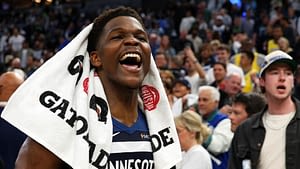Baseball Commissioner Rob Manfred Discusses Pete Rose’s Ban with President Trump
In a recent development that has stirred the baseball community, Commissioner Rob Manfred revealed that he had a conversation with President Donald Trump about the potential lifting of Pete Rose’s permanent ban from Major League Baseball. This meeting took place two weeks ago, and Manfred is now considering a request to posthumously remove Rose from the sport’s permanently ineligible list. This request was filed in January by Jeffrey Lenkov, a Southern California lawyer who represented Rose before his death at age 83.
Manfred, speaking at a meeting of the Associated Press Sports Editors, shared that the discussion with Trump also touched on other significant issues, such as the impact of immigration policies on players from countries like Cuba and Venezuela. However, when it came to the specifics of the conversation about Rose, Manfred remained tight-lipped, stating, “I met with President Trump two weeks ago … and one of the topics was Pete Rose, but I’m not going beyond that.”
President Trump had previously taken to social media on February 28, announcing his intention to issue “a complete PARDON of Pete Rose.” Trump acknowledged that Rose “shouldn’t have been gambling on baseball, but only bet on HIS TEAM WINNING.” However, the details of what a presidential pardon would entail remain unclear, as Trump did not address Rose’s 1990 tax case, where he pleaded guilty to filing false tax returns and served a five-month prison sentence.
Rose, who passed away in September, left behind a legacy of 4,256 hits, holding records for games (3,562) and plate appearances (15,890). He was the 1973 National League MVP and played on three World Series-winning teams. Despite his achievements, an investigation led by lawyer John M. Dowd found that Rose placed numerous bets on the Cincinnati Reds to win from 1985-87 while he was both a player and manager. This led to Rose agreeing to a permanent ban in 1989.
Lenkov’s petition aims to have Rose reinstated so he can be considered for the Hall of Fame. According to a rule adopted by the Hall’s board of directors in 1991, anyone on the permanently ineligible list cannot be considered for election. Rose had previously applied for reinstatement in 1997 and met with Commissioner Bud Selig in 2002, but Selig never ruled on the request. Manfred himself denied Rose’s application for reinstatement in 2015.
Manfred acknowledged that reinstating Rose is “a little more complicated than it might appear on the outside” and did not commit to a specific timeline, stating, “I want to get it done promptly as soon as we get the work done.” He assured that he would not let the issue linger, saying, “I’m not going to give this the pocket veto. I will in fact issue a ruling.”
Even if Rose were reinstated, it wouldn’t guarantee his appearance on a Hall of Fame ballot. He would first need to be nominated by the Hall’s Historical Overview Committee, which is selected by the Baseball Writers’ Association of America and approved by the Hall’s board. Manfred mentioned that he has been in regular contact with chairman Jane Forbes Clark, noting, “I mean, believe me, a lot of Hall of Fame dialogue on this one.”
- If reinstated, Rose could potentially be eligible for consideration by the 16-member Classic Baseball Era committee in December 2027.
Manfred also addressed the issue of baseball’s current ties to legal sports betting, emphasizing that it should not influence views on Rose’s case. “There is and always has been a clear demarcation between what Rob Manfred, ordinary citizen, can do on the one hand, and what someone who has the privilege to play or work in Major League Baseball can do on the other in respect to gambling,” he explained. “The fact that the law changed, and we sell data and/or sponsorships, which is essentially all we do, to sports betting enterprises, I don’t think changes that.”
He further elaborated, “It’s a privilege to play Major League Baseball. As with every privilege, there comes responsibilities. One of those responsibilities is that they not bet on the game.”
Regarding his discussion with Trump about foreign-born players, Manfred expressed concern but did not delve into specifics. “Given the number of foreign-born players we have, we’re always concerned about ingress and egress,” he said. “We have had dialogue with the administration about this topic. And, you know, they’re very interested in sports. They understand the unique need to be able to go back and forth, and I’m going to leave it at that.”
Originally Written by: ESPN.com





















